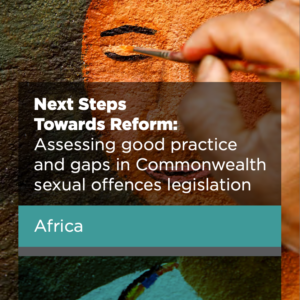All non-penetrative, non-consensual physical sexual acts are criminal offences. Good practice sexual assault laws must be defined broadly to include all kinds of non-penetrative assaults of a sexual nature.
Contrary to good practice, many sexual offences laws in the Commonwealth do not define these offences, which are commonly called ‘indecent’ acts or assaults. Such laws may be interpreted by local courts to cover the acts in question, but this is not transparent or clear and may be more likely to lead to a narrow interpretation, excluding a range of assaults of a sexual nature from the criminal law. These offences should be clearly and broadly defined in legislation to include, at least, non-consensual touching, groping or physical contact of a sexual nature, whether over or under clothes, for example of genitals, breasts or anus using any body part (including semen) or object, as well as using genitals to touch any part of the body. They should also include any act of sexual stimulation and forcing a person to perform sexual acts on themselves or others, or to watch such acts.
The use of the term ‘indecent’ act or assault, while a common feature of sexual offences laws in Commonwealth jurisdictions, is not good practice because it treats the crime as a moral attack rather than as a violent assault. These crimes should be re-named and characterised as assaults of a sexual nature.



